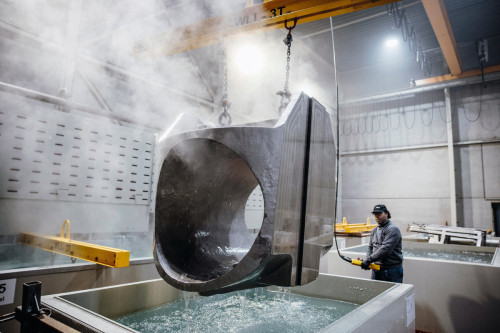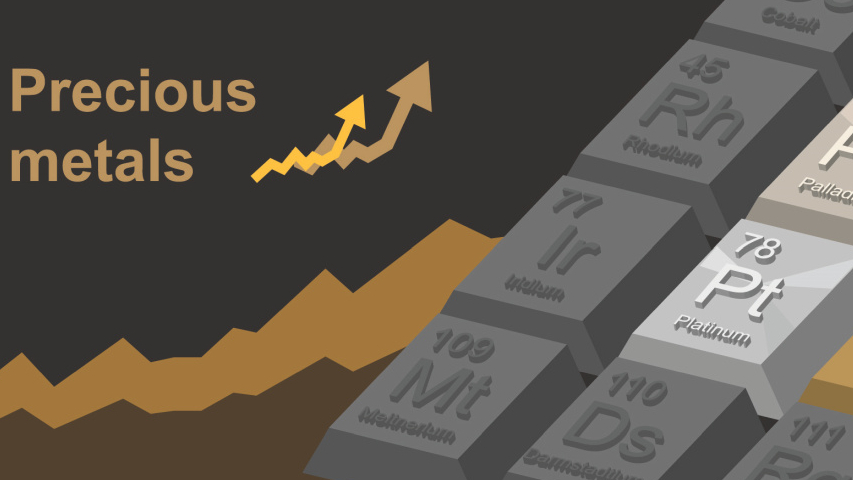The war in Ukraine has exposed many dependencies as well as the advantages and disadvantages of the global market. Many companies in the electroplating industry now have to overcome challenges on which a great deal depends - up to and including the question of their very existence. Supply chains, sales markets and technologies are being fundamentally called into question for many years or even decades to come. In view of current and possible future sanctions as well as indirect threats such as IT security and infrastructure, there is a lot to consider, evaluate and decide. Only a sober view can help to strategically address the opportunities and risks that arise.
Dependence on Russian raw materials
The effects of the sanctions and market speculation or uncertainty are already being felt. This is exacerbating the uncertainties that have existed since the end of last year with regard to medium and long-term energy prices. We should not only look at natural gas and oil, but also at the price of electricity. It can lead to a false sense of security on this issue. This is because some natural gas is burned in gas-fired power plants to generate electricity. Last year, the proportion of electricity generated from natural gas was around 16%. It should also be noted that no electricity was imported directly from Russia, but from our direct neighbors, such as France or Denmark.
As a result of the energy-intensive value creation in electroplating and surface technology, incalculable costing risks could now be incurred for the manufacture of products. Particularly if daily energy prices are a factor. And even if long-term energy supply contracts promise a certain degree of security in terms of costing, the highly volatile energy market can now lead to contracts being terminated by suppliers or the supplier even becoming insolvent.
Short-term solutions, such as switching suppliers and committing to long-term supply contracts, could help. However, due to the new circumstances, it is advisable to check whether other long-term alternatives are viable. One conceivable option is to generate your own electricity from renewable energy sources. This would have the additional and positive side effect of reducing the company's ownCO2 footprint.
Prices for metals fluctuate strongly and tend to rise
What could weigh more heavily, however, are prices for metals or crude oil products, such as plastics or organic additives for process control. If we look at metals, price increases are already clearly noticeable. Since mid-February, the price of nickel has at times broken through the 100,000 US dollar mark. By comparison, the average price for nickel in 2021 was USD 18,500. One consequence of the extreme price increase was that commodity trading on the London Stock Exchange was interrupted.
However, Russia is also very important in the production of other metals such as copper, gold, platinum and palladium, which means that their prices are also rising. Thinking further, it is not only metallization that has come under price pressure, but also the production costs for alloys such as steels or brass. These are processed in upstream value chains and then sent to surface technology for finishing. This will increase price pressure throughout the entire supply chain and will most likely also affect the surface technology sector. In order to deal with possible supply bottlenecks, price surprises or tense negotiations in a prepared and agile manner, it is advisable to strengthen communication with as many participants in the supply chain as possible.
Global market is shrinking - desire for sustainable products is increasing
 Pipeline component shortly before nickel plating at MTV in Belgium. The price of nickel in particular has risen massively as a result of the conflictThemany small and large changes mean that Germany as a business location is exposed to increased competition and supply chains are being reassessed. In this context, it could be useful to look at possible changes affecting the Chinese market now. The West's political relations with China are fragile and business relationships have long been associated with a certain degree of risk. The closeness publicly celebrated by Russia and China is a reason to at least be aware of the risk. It is better to be prepared than to experience a paralyzing surprise.
Pipeline component shortly before nickel plating at MTV in Belgium. The price of nickel in particular has risen massively as a result of the conflictThemany small and large changes mean that Germany as a business location is exposed to increased competition and supply chains are being reassessed. In this context, it could be useful to look at possible changes affecting the Chinese market now. The West's political relations with China are fragile and business relationships have long been associated with a certain degree of risk. The closeness publicly celebrated by Russia and China is a reason to at least be aware of the risk. It is better to be prepared than to experience a paralyzing surprise.
The automotive industry in particular is confronted with rapidly accelerating changes in the domestic and global markets. In addition to the pressure to push ahead with the electrification of the product portfolio, it is now also necessary to price in hedges resulting from the loss of a sales market and the reorganization of supply chains.
There have already been production stops at VW due to a lack of cable harnesses. These were supplied by a supplier in Ukraine. What's more, all the major automotive groups BMW, VW, Toyota, General Motors and Mercedes are stopping or severely restricting the production and sale of their products in Russia. As the German electroplating industry is part of the global supply chain, this is also likely to have an impact on domestic business. The low margins of automotive manufacturers will be put under even more pressure and this pressure could then be passed on within the supply chain, as has been the case in the past.
Germany as an industrial location now has the advantage that consumers and companies are paying more attention to the sustainability factor. Sustainability often means more than just the environmentally friendly manufacture of a product. It now also increasingly takes moral obligations into account. The serious willingness to "pay" for the effects of these requirements seems to be increasing. This can be seen, for example, in the discussion about sanctions on natural gas and oil against Russia, where even a supply shortfall in Germany and the EU could be supported by the German population.
Modernize IT security - stabilize digital transformation
Despite the challenges posed by the pandemic in recent years, more could be done in the area of digital transformation in electroplating and surface technology companies. After all, the decades of lagging behind in digital transformation cannot be made up in two years of the pandemic. Moreover, the use of video conferencing software is only part of this process. The additional changes are also an opportunity to take the process further and deeper. There are many more opportunities in digitalization to improve intra- and inter-company processes.
Examples include repetitive processes in accounting or HR management. Vacation requests, security levels, approval processes for procurement projects and the like can be automated. In the context of automation, it is important to describe your own process correctly in order to create an easily adaptable electronic model process
In addition to efforts in the area of digitalization, the risk of a cyber attack on a company's IT infrastructure has become much more realistic. The consequences of such an attack can be devastating. Important data could be stolen or irrevocably destroyed. Computers can be taken over and financial crime committed as a result. This can turn into a liability nightmare, even if you don't commit the crime yourself. Other possible consequences of a cyber attack include losses in productivity, the theft of intellectual property or business secrets or the cost of repairing the damage caused by the attack. The BSI Federal Office for Information Security recently warned against using the antivirus program from the Russian company Kaspersky. This could serve as a gateway for attackers. A reason to replace the IT company's products.
Electroplating companies in Germany are often not yet where they want to be or should be when it comes to cyber security and digitalization. This is because there is often a lack of qualified personnel and a lack of understanding of IT issues within the company. This is where IT service providers or university representatives could fill the corresponding gaps in demand and knowledge.
The human factor in disrupted business operations
In addition to the political and economic consequences of the Russian armed forces' "special operations" in Ukraine, the human factor must also be taken into account. People have relationships with each other that are multifaceted and whose evaluation can even be contradictory. This also applies to business relationships between companies, as these are managed and operated by people. The emotional consequences of war can therefore place an enormous burden on business operations. As interpersonal relationships can be diverse and complex, it is advisable to consider how to deal with the situation. There is a large and unpredictable potential for conflict within a company, but also in its business relationships. In addition, some conflicts are hidden for fear that their disclosure could lead to negative consequences. The suppressed conflicts can then arise suddenly and at an unfavorable time.
Furthermore, companies may have carried out technology transfers or set up subsidiaries in Russia or Ukraine. How to deal with the employee base or seconded employees established there is a major responsibility. This is where it helps to increase the exchange of information. In the case of foreign properties, the house bank or specialist lawyers can provide support.
A real-life example is the company Collini, which now has to deal more closely with its relationships with Russia. Collini operates a subsidiary in the Russian metropolis of Nizhny Novgorod, where it offers surface finishing services. Production is still continuing there, but as the war progresses, it is difficult to plan the future of the site and therefore that of the employees there.


